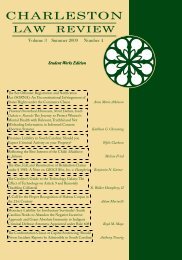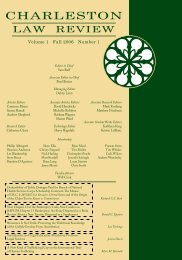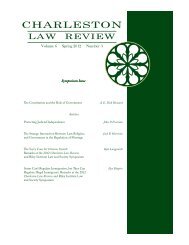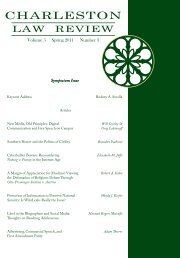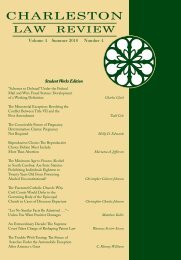- Page 1 and 2:
!!!!!!"#$%&'!(!!!!!)*+,'-!./00!!!!!
- Page 3 and 4:
CHARLESTON LAW REVIEW [Volume 5last
- Page 5 and 6:
CHARLESTON LAW REVIEW [Volume 5case
- Page 7 and 8:
CHARLESTON LAW REVIEW [Volume 5II.
- Page 9 and 10:
CHARLESTON LAW REVIEW [Volume 5A. A
- Page 11 and 12:
CHARLESTON LAW REVIEW [Volume 5that
- Page 13 and 14:
CHARLESTON LAW REVIEW [Volume 5theo
- Page 15 and 16:
CHARLESTON LAW REVIEW [Volume 5The
- Page 17 and 18:
CHARLESTON LAW REVIEW [Volume 5and
- Page 19 and 20:
CHARLESTON LAW REVIEW [Volume 5lear
- Page 21 and 22:
CHARLESTON LAW REVIEW [Volume 5they
- Page 23 and 24:
CHARLESTON LAW REVIEW [Volume 5meas
- Page 25 and 26:
CHARLESTON LAW REVIEW [Volume 5the
- Page 27 and 28:
CHARLESTON LAW REVIEW [Volume 5refl
- Page 29 and 30:
CHARLESTON LAW REVIEW [Volume 5styl
- Page 31 and 32:
CHARLESTON LAW REVIEW [Volume 5flir
- Page 33 and 34:
CHARLESTON LAW REVIEW [Volume 5and
- Page 35 and 36:
CHARLESTON LAW REVIEW [Volume 5acqu
- Page 37 and 38:
CHARLESTON LAW REVIEW [Volume 5sugg
- Page 39 and 40:
CHARLESTON LAW REVIEW [Volume 5like
- Page 41 and 42:
CHARLESTON LAW REVIEW [Volume 5clas
- Page 43 and 44:
CHARLESTON LAW REVIEW [Volume 5this
- Page 45 and 46:
CHARLESTON LAW REVIEW [Volume 5allo
- Page 47 and 48: CHARLESTON LAW REVIEW [Volume 5bein
- Page 49 and 50: CHARLESTON LAW REVIEW [Volume 5Star
- Page 51 and 52: CHARLESTON LAW REVIEW [Volume 5in t
- Page 53 and 54: CHARLESTON LAW REVIEW [Volume 5ince
- Page 55 and 56: CHARLESTON LAW REVIEW [Volume 5That
- Page 57 and 58: CHARLESTON LAW REVIEW [Volume 5impo
- Page 59 and 60: CHARLESTON LAW REVIEW [Volume 5lode
- Page 61 and 62: ERRORS IN JUDGMENT OR HOW TO GETDEB
- Page 63 and 64: 2011] Errors in Judgmentthere are s
- Page 65 and 66: 2011] Errors in Judgmentof Bankrupt
- Page 67 and 68: 2011] Errors in Judgmentthe Rules t
- Page 69 and 70: 2011] Errors in Judgment3. Adversar
- Page 71 and 72: 2011] Errors in Judgmentsuch an eff
- Page 73 and 74: 2011] Errors in Judgmentof the nume
- Page 75 and 76: 2011] Errors in Judgmentexcepting f
- Page 77 and 78: 2011] Errors in Judgmentshould have
- Page 79 and 80: 2011] Errors in Judgmentdirectors.
- Page 81 and 82: 2011] Errors in JudgmentBridgewater
- Page 83 and 84: 2011] Errors in Judgmentcan produce
- Page 85 and 86: 2011] Errors in Judgmentstate. 153
- Page 87 and 88: 2011] Errors in Judgmentpersonal re
- Page 89 and 90: 2011] Errors in Judgmentwas nullifi
- Page 91 and 92: 2011] Errors in Judgment$10,718. 21
- Page 93 and 94: 2011] Errors in Judgmentwhat the ge
- Page 95 and 96: 2011] Errors in Judgmentrights. 245
- Page 97: CHARLESTON LAW REVIEW [Volume 5B. T
- Page 101 and 102: CHARLESTON LAW REVIEW [Volume 5term
- Page 103 and 104: CHARLESTON LAW REVIEW [Volume 5trus
- Page 105 and 106: CHARLESTON LAW REVIEW [Volume 5and
- Page 107 and 108: CHARLESTON LAW REVIEW [Volume 5sati
- Page 109 and 110: CHARLESTON LAW REVIEW [Volume 5On t
- Page 111 and 112: CHARLESTON LAW REVIEW [Volume 5nonc
- Page 113 and 114: CHARLESTON LAW REVIEW [Volume 5that
- Page 115 and 116: CHARLESTON LAW REVIEW [Volume 5As a
- Page 117 and 118: CHARLESTON LAW REVIEW [Volume 5will
- Page 119 and 120: CHARLESTON LAW REVIEW [Volume 5In a
- Page 121 and 122: CHARLESTON LAW REVIEW [Volume 5has
- Page 123 and 124: CHARLESTON LAW REVIEW [Volume 5inte
- Page 125 and 126: CHARLESTON LAW REVIEW [Volume 5exce
- Page 127 and 128: CHARLESTON LAW REVIEW [Volume 5C. A
- Page 129 and 130: CHARLESTON LAW REVIEW [Volume 5corp
- Page 131 and 132: CHARLESTON LAW REVIEW [Volume 5base
- Page 133 and 134: CHARLESTON LAW REVIEW [Volume 5use
- Page 135 and 136: CHARLESTON LAW REVIEW [Volume 5rate
- Page 137 and 138: SCHULZE FINAL.doc1/20/2011 6:14PMCH
- Page 139 and 140: SCHULZE FINAL.doc1/20/2011 6:14PMCH
- Page 141 and 142: SCHULZE FINAL.doc1/20/2011 6:14PMCH
- Page 143 and 144: SCHULZE FINAL.doc1/20/2011 6:14PMCH
- Page 145 and 146: SCHULZE FINAL.doc1/20/2011 6:14PMCH
- Page 147 and 148: SCHULZE FINAL.doc1/20/2011 6:14PMCH
- Page 149 and 150:
SCHULZE FINAL.doc1/20/2011 6:14PMCH
- Page 151 and 152:
SCHULZE FINAL.doc1/20/2011 6:14PMCH
- Page 153 and 154:
SCHULZE FINAL.doc1/20/2011 6:14PMCH
- Page 155 and 156:
SCHULZE FINAL.doc1/20/2011 6:14PMCH
- Page 157 and 158:
SCHULZE FINAL.doc1/20/2011 6:14PMCH
- Page 159 and 160:
SCHULZE FINAL.doc1/20/2011 6:14PMCH
- Page 161 and 162:
SCHULZE FINAL.doc1/20/2011 6:14PMCH
- Page 163 and 164:
SCHULZE FINAL.doc1/20/2011 6:14PMCH
- Page 165 and 166:
SCHULZE FINAL.doc1/20/2011 6:14PMCH
- Page 167 and 168:
SCHULZE FINAL.doc1/20/2011 6:14PMCH
- Page 169 and 170:
SCHULZE FINAL.doc1/20/2011 6:14PMCH
- Page 171 and 172:
SCHULZE FINAL.doc1/20/2011 6:14PMCH
- Page 173 and 174:
SCHULZE FINAL.doc1/20/2011 6:14PMCH
- Page 175 and 176:
SCHULZE FINAL.doc1/20/2011 6:14PMCH
- Page 177 and 178:
SCHULZE FINAL.doc1/20/2011 6:14PMCH
- Page 179 and 180:
SCHULZE FINAL.doc1/20/2011 6:14PMCH
- Page 181 and 182:
SCHULZE FINAL.doc1/20/2011 6:14PMCH
- Page 183 and 184:
SCHULZE FINAL.doc1/20/2011 6:14PMCH
- Page 185 and 186:
SCHULZE FINAL.doc1/20/2011 6:14PMCH
- Page 187 and 188:
SCHULZE FINAL.doc1/20/2011 6:14PMCH
- Page 189 and 190:
SCHULZE FINAL.doc1/20/2011 6:14PMCH
- Page 191 and 192:
SCHULZE FINAL.doc1/20/2011 6:14PMCH
- Page 193 and 194:
SCHULZE FINAL.doc1/20/2011 6:14PMCH
- Page 195 and 196:
SCHULZE FINAL.doc1/20/2011 6:14PMCH
- Page 197 and 198:
SCHULZE FINAL.doc1/20/2011 6:14PMCH



